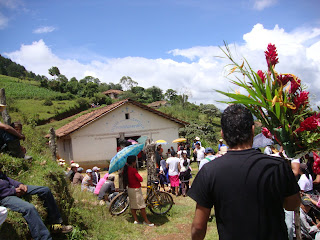Sometimes scripture really comes alive.
Thursday I went to El Zapote de Santa Rosa, a village in the Dulce Nombre parish with about 800 inhabitants. They had asked me to come out for their Holy Hour so that they could have exposition of the Eucharist. I was very happy to do this since it’s a very welcoming community.
When I arrived I found out that it would not only be exposition of the Eucharist but there would be a form of the Celebration of the Word and Communion.
The church was packed with about 200 people – women, children, and men. As usual, in addition to some men inside the church there was a group of men, mostly young man, at the church door and just a little outside– interested, curious,
They don’t have a monstrance so I propped the large host in the ciborium they have so that all could see the Host.
Before we started we decided to use the readings of the day. Marco Tulio would comment on the Gospel and I would comment on the first reading, a reading full of meaning for me.
In the morning when I read the passage, 1 Thessalonians 3: 7-13, I was awestruck by the reading. I could have written almost the same as Paul did, but about the people in El Zapote and the other villages in the parish: “What a consolation this faith of yours is for us in the midst of our troubles and trails. It is a breath of life for us when you stand firm in the Lord. How can we thank God enough for all the joy that we feel before God because of you?”
I shared my feelings with the people in the church that night, because it was what I feel. But I added that Paul, though praising the Thessalonians, had a challenge for them. The Spanish is stronger than the English translation: “Que el Señor los llene y los haga rebosar de un amor mutuo y hacia lodos los demás.” – “May the Lord fill you with love for each other and for all others and may that love overflow!”
Communion was moving as I shared the Body of Christ with the many who came forward to receive.
At the end of the exposition, before putting the Eucharist back into the tabernacle, I decided to carry the wooden ciborium down the aisle so that even the guys at the door might have a chance to worship.
 |
| A twilight view in El Zapote de Santa Rosa |
That night I slept well but got up early since I was going with folks to a workshop in Dulce Nombre on Liturgy. But before I left I gazed in wonder at the marvelous landscape before my eyes.
The workshop was for folks in Liturgical Ministry in their villages as well as for those in the formation process to become extraordinary ministers of Communion in their villages.
The morning was a test – to see what they learned. Surprisingly I found that two of the forty people there were illiterate and so we had to do an oral test with them. Some did very well on the written test but not all. Many of these people are barely literate or have vision problems that make it hard to read or are not used to taking tests. After the written test, I had them work in groups to see if they could put the parts of the Mass in order. That worked out well.
Looking at the tests I think most of the people grasp most of what we have tried to teach them about liturgy, especially the Mass.
 |
| Sor Pedrina |
After the test, Sor Pedrina led a number of sessions to help them understand how to prepare for Masses in their villages. Saturday morning we led sessions on the relation of the Eucharist and justice.
I am time after time impressed by these people – their faith, their commitment. I am also challenged by learning difficulties many of them experience, because of lack of good education. I don’t know if anyone in the group there, except for two retired teachers, had even six years of formal education. And so I try to find ways to help them learn using methods of popular education – learning by doing; use of examples, stories, and pictures; and songs. It’s a challenge but it’s something I love doing.
One of the major challenges for formation and organization of pastoral workers is their low level of education and so I’m looking into ways to help them read aloud better and develop better comprehension skills. We did some of this on Saturday morning and I hope to find ways to incorporate this into other training sessions. These people do so much with so little and I’d like to find ways to help them even more.
After the workshop I headed to Gracias to the blessing of the new convent of the Dubuque Franciscan Sisters, Casa Betania – Bethany House. Sister Nancy Meyerhofer and Sister Brenda Whetstone are member of the Franciscan Sisters of the Holy Family, based in Dubuque. They have been working in the Gracias parish – Nancy for about five years, Brenda for about two.
They have recently built a house outside of town as the congregation’s center here in Honduras. They hope to promote vocations here – and they have one postulant.
The house is beautiful and more than 100 people showed up for the blessing. Padre Loncho, the pastor of the parish of Gracias, celebrated Mass and blessed the house.
It was a joyous occasion – marking a new milestone in the presence of the sisters here in Honduras.
And again it was celebrated with the Eucharist – Christ present in bread and wine and in the lives of the poor.




























